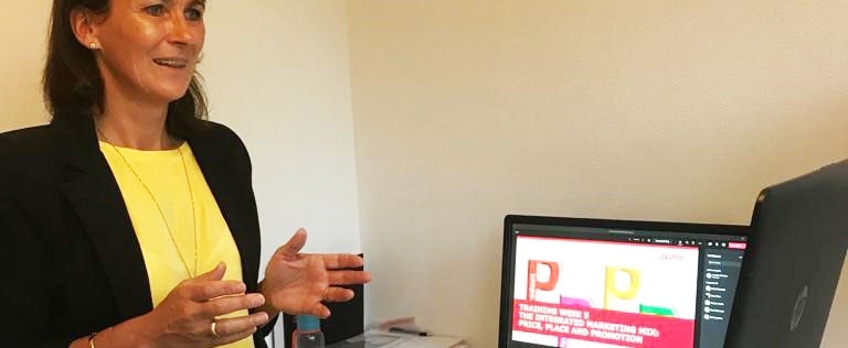Avans School of International Studies is doing everything online currently. The lecturers have exchanged classroom teaching and paper tests for digital learning environments, and their students are still based all over the globe.
Out of the 269 new students this year, just over 220 have gotten to know one another through assignments and remote interaction rather than face to face, seated at the bar of a pub in Breda. This year, they had their introduction days online. ‘The mood among lecturers and staff was euphoric after this year’s new student orientation,’ says Janneke Nobelen, lecturer and first-year coordinator at ASIS. ‘We were extremely pleased that it was such a success.’ This is the first time that Avans organised its activities for the introduction days entirely online.
From classrooms to Teams
Both lecturers and students embarked on the online curriculum brimming with enthusiasm and good spirits. Presentations in classrooms and lecture halls were transformed into lectures and tutorials that were held via Teams. All of the first-semester courses at International Business and Finance & Control International are currently taught digitally. The school also opted for this approach to enable international students to participate. ‘The majority of our international students are still in their home country’, explains Nobelen. ‘They are based all over the world, from Botswana to Japan.’
However, online teaching is anything but smooth sailing. Most lecturers agree that interaction is the most difficult aspect. Nobelen continues: ‘When you give a class online, the dynamics simply aren’t the same. There are plenty of tools, but these are no substitute for genuine physical contact with our students.’
Breaking barriers
Nevertheless, there are a few advantages to online teaching. Although the didactics of a digital environment may be different, lecturers have noticed that this offers new opportunities. ‘Students are less likely to experience barriers when it comes to asking questions online More introverted students are able to raise their voices much easier thanks to the chat options.
Neither have the attendance rates dropped. Apart from a handful of exceptions, the first-year students are all present during their Teams classes. Nobelen adds: ‘Attendance has always been high among first-year students. It’s good to see that this is no different for classes given online.’ This is important, considering that attendance is considered an essential requirement for study success.
Two students about corona-proof education
Two students speak about their experiences with corona-proof education. ‘Knowing that I can remain in my home country for the time makes things a lot less stressful for me. I can save a lot of money now that I don’t need to rent a room in the Netherlands,’ says Victor Bojilov, a Bulgarian first-year student in the Finance & Control International programme.
Max van Raamsdonk agrees. Max studies International Business in Breda and lives in Belgium. He will be living at home for the time being. ‘This lets me save a lot of money. All I need to do now is focus on my studies this year.’
A lot more discipline
Of course, Max and Victor have their concerns about the online curriculum. ‘Doing everything online requires a lot more discipline,’ says Max with a sigh. ‘I'm very social and get my energy and motivation to study from physical meetings. I can forget about all of that for now. There’s no comparing online classes to working at home at my laptop. I am solely responsible for my motivation.’
Max says that he is impressed with the quality of the education. He is amazed by how the lecturers were able to create online versions of the courses they normally teach in person. ‘I have nothing but understanding and praise for them.’ Victor also says that he is surprised about the ‘outstanding quality’ of the education he has been receiving.
Interaction with fellow students
Max has already enjoyed lots of contact with his classmates. ‘There really is plenty of interaction in the virtual classroom. However, we do want to meet one another in person soon. We understand that this is not possible on campus, so we will have to find another venue.’
Victor thinks that it will be difficult for him to make friends. ‘I live in Bulgaria and can only meet my fellow students online. I even have classmates living in different time zones. Meeting one another is difficult.’ He is afraid that he will be missing out on ‘real student life’. I had hoped for a lot of fun and excitement during my life as a student. Now, I know that I can forget about this during my first year.’
Hybrid education
‘Whether or not ASIS will continue with online education in the second semester depends on how the pandemic will develop’, says Nobelen. ‘We are hoping to launch a form of hybrid education after the crisis, in which online education will take the place of physical teaching. What we want is to create a method that combines both aspects.
